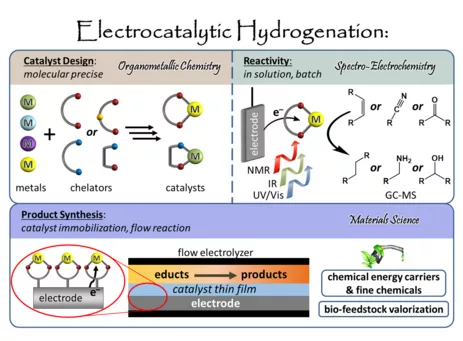Dominik Halter
Electrocatalysis

Research in the Halter group targets novel strategies for electro-organic synthesis of chemical energy carriers and value-added products, enabled by new molecular and solid state electrocatalysts. Specifically, group 9 and first row transition metal complexes are developed to mediate the atom economic and energy efficient electrocatalytic hydrogenation of organic carbonyls, nitriles, unsaturated hydrocarbons and aromatics. Advanced electrochemical methods and in situ spectroscopy allow a detailed understanding of electrocatalytic cycles, to inform the design of new catalyst generations with higher energy efficiency and conversion rates. Well-performing catalysts are immobilized to surfaces with tethering ligands or within metal-organic framework thin films, to create functional electrodes as process friendly solid state hydrogenation electrocatalysts. These functional electrode materials are then employed in continuous flow electrolysis, to enable bulk synthesis of target compounds and the valorization of biological feedstocks based on the newly developed reactivity.

Key publications:
Uranium-mediated electrocatalytic dihydrogen production from water, D. P. Halter, F. W. Heinemann, J. Bachmann, K. Meyer,* Nature 2016, 530, 317–321.
The role of uranium–arene bonding in H2O reduction catalysis, D. P. Halter, F. W. Heinemann, L. Maron, K. Meyer,* Nat. Chem. 2018, 10, 259–267.
Electrocatalytic H2O Reduction with f-Elements: Mechanistic Insight and Overpotential Tuning in a Series of Lanthanide Complexes, D. P. Halter, C. T. Palumbo, J. W. Ziller, M. Gembicky, A. L. Rheingold, W. J. Evans,* K. Meyer,* J. Am. Chem. Soc. 2018, 140, 2587–2594.